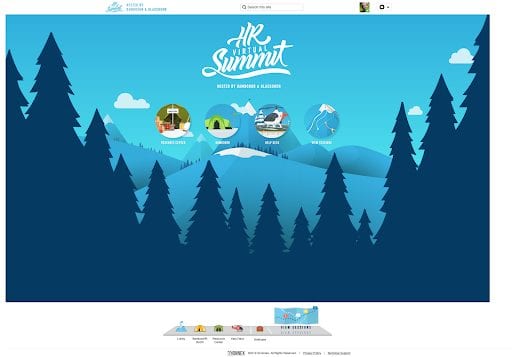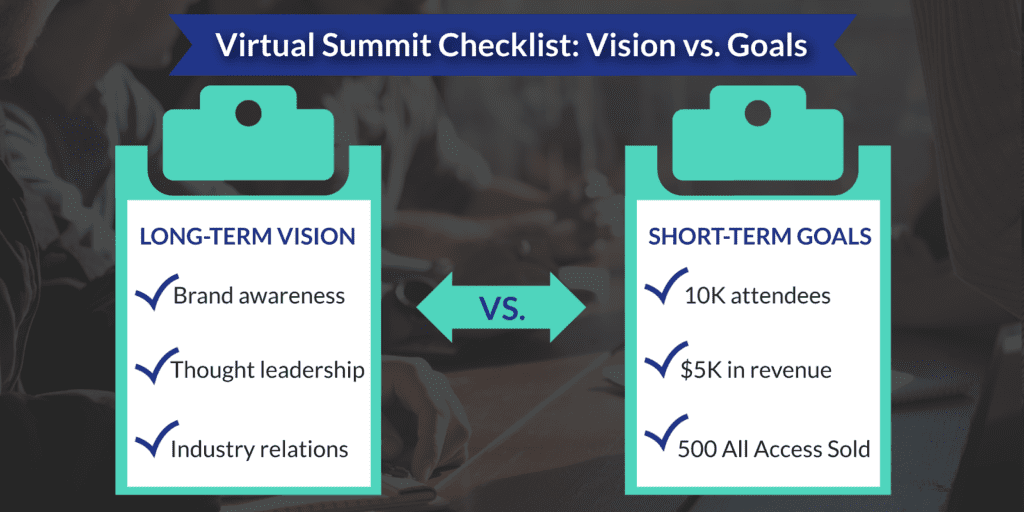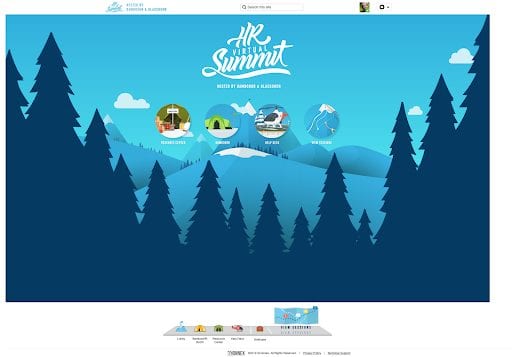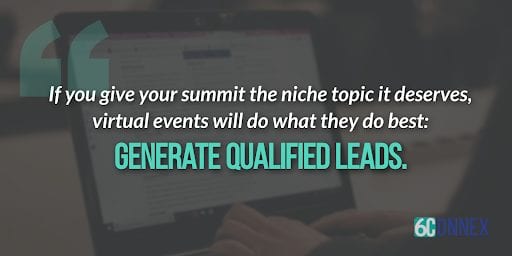How to Choose a Profitable Virtual Summit Topic
6Connex Team
Jun 9, 2020 1:36:30 PM

Most seasoned virtual event marketers would agree that the first step to virtual summit mastery is a winning topic. After all, there’s a reason it holds the #1 spot on your virtual summit checklist. But what does it mean to have a successful online summit topic, and how do you choose one?
Whether you’re running a virtual summit for lead generation or launching a new product, a strategic summit topic will either make or break your attendance AND your bottom line. We are going to uncover all of the secrets that go into creating a profitable virtual summit topic by teaching you how to create one for your own business – from vision to strategy to analytics

Vision and goals are very different. Goals produce short-term ROI, vision produces long-term ROI. Lucky for us, virtual summits help us achieve both.
Whereas visions feed our souls, goals feed our bank accounts (someone has to).
Get the idea? The bottom line is that it’s crucial to be strategic with your goals while still remaining true to your vision. So what’s the solution? Focus on something that happens to be relevant or trendy in your industry but also happens to fall within the trajectory of your long-term vision. That way, you attract industry professionals today who may become your greatest marketers tomorrow.
To find a topic that will be profitable and bring in leads, there should only be 2-3 potential topics that come to mind. After all, your marketing team doesn’t spend all of their days working on building your brand authority for nothing. Your virtual event is the time to showcase it.
Here’s a little case study of this strategy in action. Every year, the HR enablement software Bamboo HR hosts the World’s Largest Virtual HR Conference with 6Connex virtual events platform. Bamboo HR has built authority in its industry through years of experience, research, and forging important connections. In their case, it only made sense to create a virtual summit topic that brought together the best of their industry.

Building on that authority year after year, they’ve gone from 6,000 attendees to an astonishing 25,000 and have generated countless leads through the process. Hear more about their virtual event and why they chose 6Connex in their virtual event platform review.
Let’s take a look at another example. Imagine your company offered an AI-powered sales service whose greater purpose was to innovate and automate the worldwide sales industry. Your topic of authority might be “The Future of Global AI for Marketing and Sales”. But there’s a catch… just because you have authority on a topic doesn’t mean it will convert attendees during a specific season. That’s where the analytics come in.
Choosing a virtual event topic that converts attendees starts with empathy. That’s just good SEO. What are your readers searching for? Where are the information/content gaps that need to be filled? The internet is swarming with data to help you locate the current interest of your readers. Some examples of analytical tools you can use are:
The data generated by users and the online conversations created around your brand are some of the most valuable criteria you have in creating your virtual summit topic. Before creating your virtual summit, make sure you have a virtual event software with analytics.

Your sales team knows better than anyone how to sell your awesome product and what prospective clients are most interested in learning about. They also know in which part of the funnel they lose clients. This falls back in line with empathy. You should utilize your sales team to understand what your clients want to learn more about (technology, trends, research, etc.) This way, you can find a topic that will bring attendees and sell your product.
Use this opportunity to find a topic that will better address the pain points of your potential client, thus bringing in more attendees to your virtual summit and more results.
Focus is your friend. Choosing a niche for your virtual summit is like choosing a niche for your business: when you know exactly who you are targeting, it is easier to market to them. Here’s an example. If you sell an invoice automation software, imagine you make your topic “The Most Transformative Business SaaS Companies 2019”. Everyone’s app wants to be seen as being “transformative” and “innovative”, and speakers would flock to present. However, you wouldn’t even know where to begin marketing this virtual summit. Instead, cast a smaller net. “The Digital Transformation of Accounting/Financial Services”. This is a good way to attack one subject from various angles: AI in accounting, automation, impact on bottom lines, extraction of big data, etc. Your marketing team can then tackle the narrow niche head-on by posting in accounting related LinkedIn groups, Facebook groups, small-medium sized startup groups, etc. If you give your virtual event the niche topic it deserves, virtual events will do what they do best: generate qualified leads.

Business professionals have insanely busy schedules, and they have to be exclusive about which virtual summits they sign up for.Since you can’t hand out branded t-shirts and mugs as you would at a normal event, you must make sure your attendees don’t walk away empty-handed. Choose a topic that will indicate to your attendees that they will walk away with X, Y, Z tangible skills, or that they’ll have the foundation to implement a tangible strategy. Why is this important? Because on average, people forget up to 50% of new information within one hour. That number escalates up to 70% within 24 hours, and 90% within a week.
Here’s the solution to this memory deficit: pick 2-3 tangible skills (for example, research-backed tips on closing or top-notch SEO hacks) that you want your attendees to remember and associate your brand with. That way, attendees can take those skills back to their companies and employ them right away, remembering YOUR company as the ultimate resource on this information. Remember: Your virtual summit topic should become synonymous with the value you are giving away as a company, and should thus be associated directly with the product or service you sell.
Have your topic in mind? Download our free virtual event planner e-book to get started on your own virtual summit checklist.

Need a battle-tested virtual events software to bring your summit to fruition? Partner with 6Connex for scalable streaming and strategic guidance that will help you reach your goals.
Additional Resources:
You’ve Decided to Host a Virtual Summit—Now What?
6Connex is the leading provider of in-person, hybrid, and virtual event technology for enterprises worldwide. Our cloud-based product portfolio includes event management tools, in-person event apps, virtual venues, webinars, learning management, and more.
From internal meetings to large scale conferences, we allow you to engage and transform big ideas into real-world results.
425 Soledad St.
Suite #500
San Antonio, TX 78205
1.800.395.4702
Australia: +61.2.72294013
Brazil: +55.11.4375.3555
United Kingdom: +44.20.37447284
United States: +1.210.890.5769